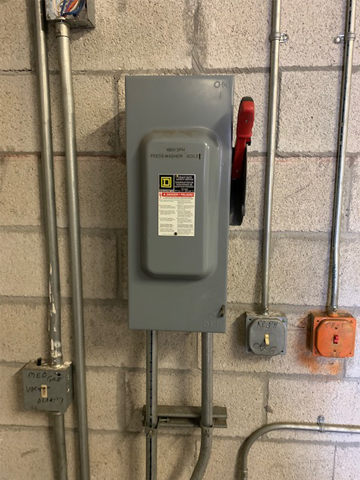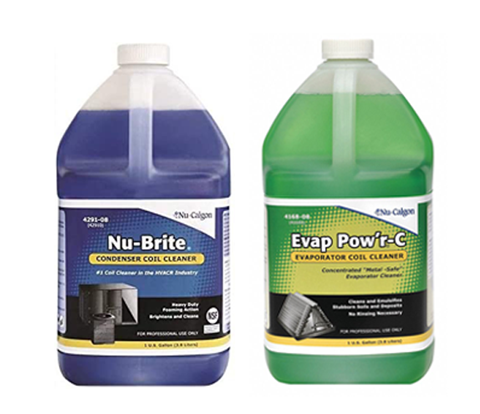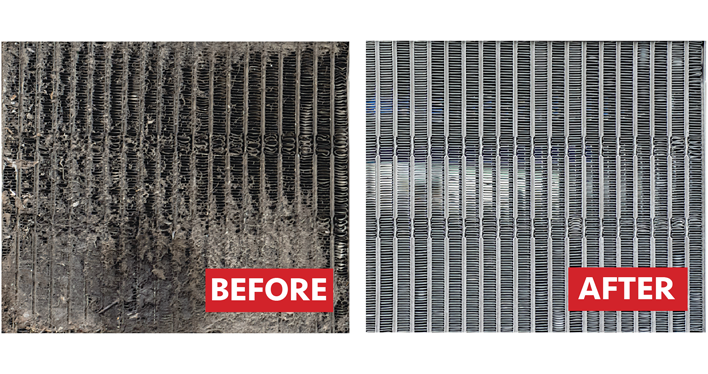How to Clean Commercial HVAC Coils: A Comprehensive Guide
Keeping your HVAC coils clean is essential for optimal performance, energy efficiency, and extending the life of your system. Regular maintenance can save you money in the long run and prevent costly repairs.
Dirty HVAC coils can significantly increase energy consumption by up to 30%, which is why it’s crucial to implement a regular cleaning schedule—especially after installing new equipment. Just like a visit to the dentist, coil cleaning may not be something you look forward to, but it's an essential part of maintaining your system. With the right tools and guidance, it doesn’t have to be too bad.
How Do I Know If My Coils Are Dirty?
While a scheduled maintenance plan is the best way to keep your coils in top shape, there are some signs that indicate they need attention:
- Check the air pressure drop across the coil compared to the design specifications. A higher than normal pressure drop usually means the coil is dirty.
- For condenser coils, high refrigerant head pressure is a sign of buildup. For DX evaporator coils, low suction pressure and poor airflow may indicate a problem.
- Visually inspect the coil. If it looks dirty, it probably is.
How Often Should Coils Be Cleaned?
Under normal conditions, a DX evaporator or condenser coil should be cleaned once a year. However, in areas with high dust, humidity, or pollution, more frequent cleaning is necessary. Coils with high fin density tend to collect dirt faster and require more regular maintenance.
Condenser coils under extreme conditions: Clean quarterly
Units near saltwater (within one mile): Clean monthly
DX evaporator coils in corrosive environments: Clean quarterly
How to Clean a Coil
Before starting, always disconnect and lock out the electrical power to avoid any risk of the unit turning on. Avoid saturating motors or electrical components, as this could lead to damage.

Remove large debris and straighten any bent fins before cleaning. Use a pressure washer with a 25–40 degree nozzle to avoid damaging the delicate aluminum fins. Apply a non-acidic, alkaline-based cleaner like Nu-Brite for condenser coils or Evap Pow’r-C for evaporator coils. These cleaners help lift dirt from deep within the coil.

If you must use an acidic cleaner, follow the manufacturer’s instructions carefully. Any leftover residue can harm the coil. If scrubbing is needed, only use a soft-bristled brush. After cleaning, rinse thoroughly with a power washer or hose.
Never ignore the manufacturer’s guidelines when using chemical cleaners. Improper use can cause serious damage to your system or even personal injury. Always wear protective gear and ensure proper ventilation.
Use Steam to Minimize Mess
For interior coils, steam cleaning is an effective and less messy alternative. It helps loosen dirt without over-saturating sensitive components. Keep the steam pressure low and apply it parallel to the fins to avoid bending them.
A Little Maintenance Goes a Long Way
Properly maintained commercial HVAC coils can last many years. Condenser coils typically last 10–15 years, DX evaporator coils 15–20 years, and water coils over 20 years. A quality replacement coil can often match or exceed the lifespan of an OEM part, especially if it uses thicker materials.
However, environmental factors like location, humidity, and exposure to chemicals can affect the coil’s longevity. That’s why regular inspections and cleaning are so important.
What If My Coil Is Coated?
Coated coils resist corrosion from contaminants, but they still need regular cleaning. Even coated coils can become clogged, so maintenance should be done just as frequently as with uncoated ones. Proper care ensures the coating remains effective over time.

Regular maintenance isn’t just about keeping your system running—it’s about protecting your investment. If you have questions or need a quote, feel free to reach out anytime.
Written by: Stephen Barzelatto
Vice President of Nationwide Coils
Agricultural product packaging Mesh Bags are a commonly used agricultural product packaging material, usually used to package agricultural products such as vegetables, fruits, flowers, etc. for easy transportation, storage, and sales. This type of net bag is usually made of materials such as polypropylene, which is lightweight, breathable, durable, moisture-proof, and insect proof, effectively protecting the quality and freshness of agricultural products.
Plastic mesh produce bags are lightweight, durable, and breathable bags that are used to store and transport fruits and vegetables. They are typically made from high-density polyethylene (HDPE) or low-density polyethylene (LDPE) plastic, which is a type of plastic that is recyclable and can be reused multiple times.
These bags are designed to allow air to circulate around the produce, which helps to prevent moisture buildup and decay. They are also transparent, allowing customers to easily see the contents of the bag.
Plastic mesh produce bags are commonly used in grocery stores, farmers markets, and other retail settings. They are available in a variety of sizes and can be customized with logos or branding.
While plastic mesh produce bags are convenient and affordable, they do contribute to plastic waste. Many retailers and consumers are now opting for reusable produce bags made from fabric or mesh
Mesh Produce Bags,Mesh Onion Bags Ginger Net Bag,Bag Monofilament Mesh Net Bag,Big Mesh Net Bag
Suzhou Yitengjia Extruded Net Packaging Co., Ltd. , https://www.plasticnetbag.com
